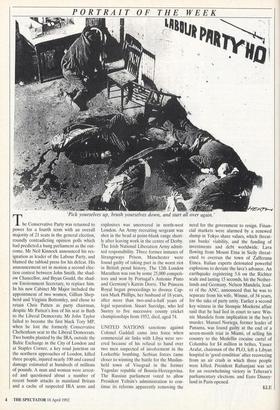PORTRAIT OF THE WEEK
`Pick yourselves up, brush yourselves down, and start all over again.' The Conservative Party was returned to power for a fourth term with an overall majority of 21 seats in the general election, roundly contradicting opinion polls which had predicted.a hung parliament as the out- come. Mr Neil Kinnock announced his res- ignation as leader of the Labour Party, and blamed the tabloid press for his defeat. His announcement set in motion a second elec- tion contest between John Smith, the shad- ow Chancellor, and Bryan Gould, the shad- ow Environment Secretary, to replace him. In his new Cabinet Mr Major included the appointment of two women, Gillian Shep- herd and Virginia Bottomley, and chose to retain Chris Patten as party chairman, despite Mr Patten's loss of his seat in Bath to the Liberal Democrats. Mr John Taylor failed to become the first black Tory MP, when he lost the formerly Conservative Cheltenham seat to the Liberal Democrats. Two bombs planted by the IRA, outside the Baltic Exchange in the City of London and at Staples Corner, a key road junction on the northern approaches of London, killed three people, injured nearly 100 and caused damage estimated at hundreds of millions of pounds. A man and woman were arrest- ed and questioned about a number of recent bomb attacks in mainland Britain and a cache of suspected IRA arms and
explosives was uncovered in north-west London. An Army recruiting sergeant was shot in the head at point-blank range short- ly after leaving work in the centre of Derby. The Irish National Liberation Army admit- ted responsibility. Three former inmates of Strangeways Prison, Manchester were found guilty of taking part in the worst riot in British penal history. The 12th London Marathon was run by some 25,000 competi- tors and won by Portugal's Antqnio Pinto and Germany's Katrin Dorre. The Princess Royal began proceedings to divorce Cap- tain Mark Phillips, her husband of 18 years, after more than two-and-a-half years of legal separation. Stuart Surridge, who led Surrey to five successive county cricket championships from 1952, died, aged 74.
UNITED NATIONS sanctions against Colonel Gaddafi came into force when commercial air links with Libya were sev- ered because of his refusal to hand over two men suspected of involvement in the Lockerbie bombing. Serbian forces came closer to winning the battle for the Muslim- held town of Visegrad in the former Yugoslav republic of Bosnia-Hercegovina. The Russian parliament voted to allow President Yeltsin's administration to con- tinue its reforms apparently removing the
need for the government to resign. Finan- cial markets were alarmed by a renewed slump in Tokyo share values, which threat- ens banks' viability, and the funding of investments and debt worldwide. Lava flowing from Mount Etna in Sicily threat- ened to overrun the town of Zafferana Etnea. Italian experts detonated powerful explosions to deviate the lava's advance. An earthquake registering 5.6 on the Richter scale and lasting 15 seconds, hit the Nether- lands and Germany. Nelson Mandela, lead- er of the ANC, announced that he was to separate from his wife, Winnie, of 34 years, for the Sake of party unity. Earlier a second key witness in the Stompie Moeketsi affair said that he had lied in court to save Win- nie Mandela from implication in the boy's murder. Manuel Noriega, former leader of Panama, was found guilty at the end of a seven-month trial in Miami, of selling his country to the Medellin cocaine cartel of Columbia for $4 million in bribes. Yasser Arafat, chairman of the PLO, left a Libyan hospital in 'good condition' after recovering from an air crash in which three people were killed. President Rafsanjani was 'set for an overwhelming victory in Teheran's parliamentary elections. and Euro Disney- land in Paris opened.
KLE


















































 Previous page
Previous page